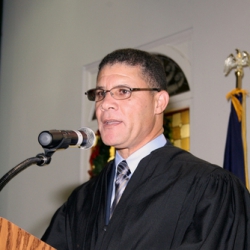
Judge Manuel Mendez Rejected a Restraining Order on the New York AG, But Scheduled an Emergency Meeting for Next Wednesday.
A New York judge on Mondey denied requests by FanDuel and DraftKings for a temporary restraining order which would have allowed them to accept real money from DFS contestants in the state of New York. He also arranged for an emergency meeting on November 25 which will determine whether their complaints are legitimate and they can proceed with activities until the Supreme Court hears their cases.
The two largest daily fantasy sports websites therefore are going to have to comply with the state attorney general’s 5-day deadline to cease and desist operations in the state. DraftKings and FanDuel control about 90% of the $3 billion daily fantasy sports industry in the United States. That industry has come under scrutiny in recent months, because officials, fans, and pundits claim it is gambling under another name. Because it is unregulated, many believe DFS gaming is open to abuse and unfairness.
Probes and Legal Actions
An October 2015 incident in which a DraftKings employee won $350K on a FanDuel contests touched-off a wave of indignation and a round of official probes into the industry. Nevada and New York both have taken the stance that DFS is gambling. Nevada moved to regulate, while New York moved to ban the activity. The lawsuits stem from a desire of the two companies to continue operations until it can be determined what the industry’s legal framework is.
Proponents of legal daily fantasy sports argue that the 2006 Unlawful Internet Gambling Enforcement Act, which creates exceptions for certain games of skill, is a loophole which makes FanDuel and DraftKings legal. Games of skills are not viewed the same way that a “game of chance” would, because gambling traditionally is seen as betting on a game of chance. Therefore, the question of whether DFS is skilled-based or chance-based is a key factor in determining its legality.
Major Corporate Investors and Partners
That had been the conventional opinion in the months and years leading up to the Ethan Haskell scandal. It was used to convince major Wall Street investment firms and mainstream American media and sports organizations to invest in the business. Comcast, NBS Sports, and Fox Sports all invested, while Sports Illustrated, USA Today, and Yahoo all have their own DFS brands. Major League Baseball, the NBA, and the NHL all have their own sponsorship deals with one daily fantasy sports service or another, while a full half of all NFL, NHL, MLB, and NBA franchises have similar sponsorship deals.
Is DFS a Game of Skill?
New York Attorney General Eric Schneiderman’s cease and desist order challenges the notion DFS is a game of skill. The arguments in the court of New York Supreme Court Judge Manuel Mendez are going to revolve around an interpretation of the statistics.
For instance, Eric Schneiderman cited a McKinsey & Company study from earlier this year which showed that 91% of winnings in daily fantasy sports go to 1.3% of players. Scheiderman contends that is evidence DFS is predatory and is based on luck–therefore it is sports gambling. DraftKings and FanDuel say it is evidence that their games are skilled-based.
What Is a Grinder?
In the jargon of the industry, a “grinder” is an entrant who uses statistics, projections, and tons of research to create advantage play situations. To the professional daily fantasy sports competitor, any one contest might come down to luck, but they have the skill to win over time by applying their knowledge to the problem.
Since the daily fantasy sports industry exploded in popularity in 2013 and 2014, a number of experts have written strategy books on the industry. They detail techniques on how to win, much the way books exist which explain strategies to win at poker, blackjack, or slots. The question is whether daily fantasy football can be beaten like poker, or whether it is purely luck-based, like slots (with books written by charlatans).
The Court of Public Opinion
In the public arena, DraftKings and FanDuel are likely to win the argument. Fantasy football and fantasy baseball owners might dismiss their opponents’ victories as luck, but deep down, they want to believe their wins are due to better skills at predicting games. The DFS companies are likely to find 50 million Americans willing to believe them. (50 million Americans play fantasy sports in a year.) Thus, you have average fantasy owners protesting the New York City office of Eric Schneiderman.
A Court of Law
Whether public perception is going to have an effect on the New York Supreme Court is another matter. Schneiderman argued that it really does not matter whether DFS is a game-of-skill or a game-of-chance, so the very premise might be on trial. At the same time, many believe Schneiderman overreached, because he seems to have included local leagues in his ban–or at least that is a legitimate reading of his cease-and-desist letter.
Ultimately, a number of key arguments involving fantasy sports are going to play out in a court of law in the New York Supreme Court. This is the first time those debates have really taken place in an official forum in the United States. The decisions the NY justices make could have a profound effect on DFS gaming throughout America, and down through the years.
